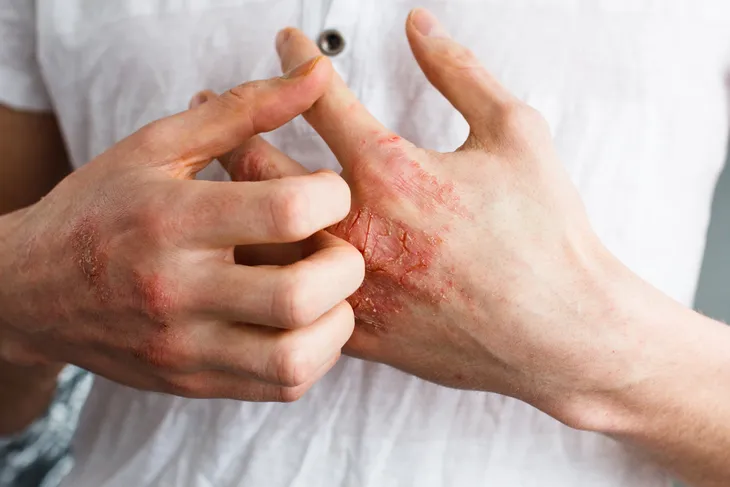Eczema is a fairly common skin disorder, characterized by patchy and inflamed skin that can blister and cause itchiness and general misery. However, while many Americans suffer from it, there’s not a whole lot of knowledge or treatments circulating out there.
Here are five lesser-known facts about eczema, and some possible ways to find some relief without scratching all day (which will make it worse)…
It Can Be Linked To Asthma
There is a higher risk of developing the skin disorder if a family member has asthma or hay fever. According to the National Eczema Association, doctors call this connection the “atopic triad,” which also explains that 80-percent of children with eczema will have a breathing problem like asthma.
Further research has been done about the relationship of eczema and asthma. According to a Washington University article, damaged skin secretes a substance through the body and triggers asthma symptoms. This progression has been referred to as the “atopic march”.
It’s Likely Hereditary
The National Eczema Association also notes that you may have inherited a predisposition to having a skin problem, making it a hereditary disorder. According to experts, 8 in 10 children will develop eczema when both parents have the condition.
Research has also shown that even if only 1 parent has eczema, their child has a 6 in 10 chance of developing it. While genetics hasn’t been cornered as a primary cause, it is definitely a contributing factor.
Eczema Can Cause Eye Damage
We don’t normally associate skin conditions with eye problems, but according to the Eczema Society of Canada, eye damage can be associated with inflammation of the skin around the eyelid due to eczema and or from seasonal allergies leading to allergic conjunctivitis.
The organization urges you to see a doctor if you have symptoms including excessive eye watering, inflammation around the eye, or any discharge from the eye.
There is No Known Cure
There is no cure for eczema as the cause of eczema is from dry skin, which is often genetically inherited. It’s a chronic problem that can rear its ugly head with “flare-ups”. While some experts believe the problem can be cured with steroids, they do not rid you of the skin irritation.
Many people think eczema is like acne and can be disposed of with better hygiene practices. However, acne and eczema are completely different. However, according to the website EczemaCanada.ca, some medications that cause acne can also make eczema symptoms worse.
It Can be Treated Through Lifestyle
Your doctor has tools in his or her arsenal to help combat eczema, before you go a bit batty from the itchiness. While some medications (such as a topical hydrocortisone or oral antihistamines) have been shown to aid in the treatment of skin problems, making a few lifestyle changes can also help reduce the severity, noted WebMD.
Since eczema stems from dry skin, gentle skin care is key. The health website explains that a mild soap and moisturizer (and even a small amount of bleach added to bathwater) can help provide relief. Use synthetic soaps referred to as syndets (lipid-free cleansers) instead of standard perfumed soaps. Reduce the length and heat of your daily shower, and reduce overall stress with exercise, added the source.








